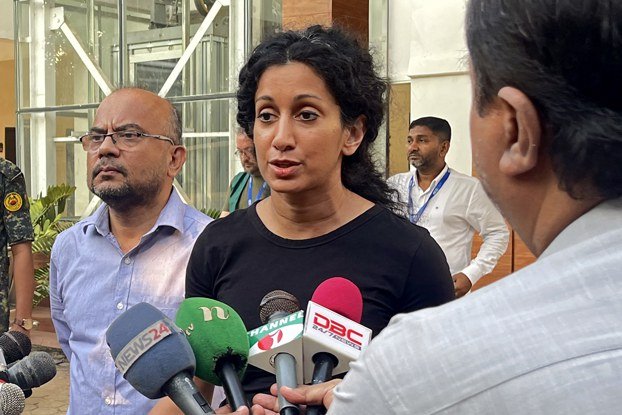Stick-wielding Chinese and Indian soldiers beat each other in minor border skirmish
Chinese and Indian soldiers bashed each other with sticks, jostling and hollering, at a disputed mountainous border near Chinese-controlled Tibet, the latest flare of violence between the two Asian giants.
A video of the incident that went viral, taken from the Indian side, shows the Indian soldiers on higher ground shouting and wielding long sticks to beat a cluster of Chinese soldiers, some of whom used clubs to swing back. At one point, an Indian soldier picks up a couple bricks and throws them into the melee.
After a few minutes, the Chinese soldiers fell back to regroup, and the Indian soldiers let out a victorious cheer for what they believed to be a successful defense of their territory.
The clash took place on Dec. 9 in the Tawang sector in northeastern India’s Arunachal Pradesh state, near the border with Chinese-controlled Tibet. Soldiers on each side sustained injuries, the Hindustan Times reported.
Each country blamed the other for sparking the incident.
Indian Defense Minister Rajnath Singh said that the Chinese soldiers crossed the Line of Actual control, de-facto border between the two countries in the disputed territory of Jammu and Kashmir, parts of which are also claimed by Pakistan.
The line divides Ladakh in the Indian-controlled area from the Chinese-administered Aksai Chin.
According to a Chinese military spokesperson, the Chinese troops were patrolling the border, and it was the Indians who had crossed the line.
Chinese Foreign Ministry spokesperson Wang Wenbin downplayed the incident by telling a news briefing Tuesday that the overall situation along the China-India border was stable.
Border war in 1962
Long-running tensions along the India-China border occasionally erupt into skirmishes. The two countries fought a war over the border in 1962. Ever since, both sides have been building infrastructure in the border region, vying to strengthen their respective claims to the area.
At the same time, growing political tension between Beijing and New Delhi could result in an escalation that neither side wants. Both countries are nuclear powers and China is one of India’s major trading partners.
Observers say that negotiation would be the best strategy to resolve the tensions, but a former Indian official said China is likely to strengthen its position on the border.
“If we go back into history, right from the beginning China has made it clear that China is the only dominant power in the Indo-pacific region,” Jayadeva Ranade, who was once the Cabinet Secretariat of the Indian government and is now president of the Delhi-based Centre for China Analysis and Strategy, told RFA’s Tibetan Service.
“If we look at it only in the context of Tibetan territory, they have made a similar claim on Ladakh and Arunachal,” he said.
Ranade said that Chinese President Xi Jinping has no plans to ease tensions with Russia, as several people with experience in the Chinese military’s Western Theatre Command were appointed to important positions.
"I think there is a focus on this border. And I expect there will be a push for more clashes or skirmishes in the times to come,” he said.
China views the disputed territory as one it lost at a time when the country was weak, and now it is looking to reclaim it, Kalpit Mankikar, a fellow with the Strategic Studies Programme at the Delhi-based Observer Research Foundation.
“But now that China is strong, look at Xi Jinping’s pronouncement. He has been talking about a rich nation and a strong army,” said Mankikar. “So, this has been happening throughout this year and Xi has been meeting with the [army] leadership and these meetings are well publicized.”
Historical, cultural significance
The disputed area has historical significance, as it was the area that Tibet’s foremost spiritual leader, the Dalai Lama, fled to in 1959 when he went into exile, Ninong Ering, a member of the Arunachal Pradesh Legislative Assembly, told RFA.
“Tawang is the holy place from where His Holiness the Dalai Lama entered into India. So that is the reason that Chinese are really agitated and they always like to claim Tawang or the parts of Arunachal as China,” he said.
“China says Arunachal is southern Tibet,” Ering said. “Let me be very frank that people of Arunachal are very proud that we are Indians, and we have that nationalistic feeling.”
Translated by Tenzin Dickyi. Written in English by Eugene Whong. Edited by Malcolm Foster.
[圖擷取自網路,如有疑問請私訊]
A video of the incident that went viral, taken from the Indian side, shows the Indian soldiers on higher ground shouting and wielding long sticks to beat a cluster of Chinese soldiers, some of whom used clubs to swing back. At one point, an Indian soldier picks up a couple bricks and throws them into the melee.
After a few minutes, the Chinese soldiers fell back to regroup, and the Indian soldiers let out a victorious cheer for what they believed to be a successful defense of their territory.
The clash took place on Dec. 9 in the Tawang sector in northeastern India’s Arunachal Pradesh state, near the border with Chinese-controlled Tibet. Soldiers on each side sustained injuries, the Hindustan Times reported.
Each country blamed the other for sparking the incident.
Indian Defense Minister Rajnath Singh said that the Chinese soldiers crossed the Line of Actual control, de-facto border between the two countries in the disputed territory of Jammu and Kashmir, parts of which are also claimed by Pakistan.
The line divides Ladakh in the Indian-controlled area from the Chinese-administered Aksai Chin.
According to a Chinese military spokesperson, the Chinese troops were patrolling the border, and it was the Indians who had crossed the line.
Chinese Foreign Ministry spokesperson Wang Wenbin downplayed the incident by telling a news briefing Tuesday that the overall situation along the China-India border was stable.
Border war in 1962
Long-running tensions along the India-China border occasionally erupt into skirmishes. The two countries fought a war over the border in 1962. Ever since, both sides have been building infrastructure in the border region, vying to strengthen their respective claims to the area.
At the same time, growing political tension between Beijing and New Delhi could result in an escalation that neither side wants. Both countries are nuclear powers and China is one of India’s major trading partners.
Observers say that negotiation would be the best strategy to resolve the tensions, but a former Indian official said China is likely to strengthen its position on the border.
“If we go back into history, right from the beginning China has made it clear that China is the only dominant power in the Indo-pacific region,” Jayadeva Ranade, who was once the Cabinet Secretariat of the Indian government and is now president of the Delhi-based Centre for China Analysis and Strategy, told RFA’s Tibetan Service.
“If we look at it only in the context of Tibetan territory, they have made a similar claim on Ladakh and Arunachal,” he said.
Ranade said that Chinese President Xi Jinping has no plans to ease tensions with Russia, as several people with experience in the Chinese military’s Western Theatre Command were appointed to important positions.
"I think there is a focus on this border. And I expect there will be a push for more clashes or skirmishes in the times to come,” he said.
China views the disputed territory as one it lost at a time when the country was weak, and now it is looking to reclaim it, Kalpit Mankikar, a fellow with the Strategic Studies Programme at the Delhi-based Observer Research Foundation.
“But now that China is strong, look at Xi Jinping’s pronouncement. He has been talking about a rich nation and a strong army,” said Mankikar. “So, this has been happening throughout this year and Xi has been meeting with the [army] leadership and these meetings are well publicized.”
Historical, cultural significance
The disputed area has historical significance, as it was the area that Tibet’s foremost spiritual leader, the Dalai Lama, fled to in 1959 when he went into exile, Ninong Ering, a member of the Arunachal Pradesh Legislative Assembly, told RFA.
“Tawang is the holy place from where His Holiness the Dalai Lama entered into India. So that is the reason that Chinese are really agitated and they always like to claim Tawang or the parts of Arunachal as China,” he said.
“China says Arunachal is southern Tibet,” Ering said. “Let me be very frank that people of Arunachal are very proud that we are Indians, and we have that nationalistic feeling.”
Translated by Tenzin Dickyi. Written in English by Eugene Whong. Edited by Malcolm Foster.
[圖擷取自網路,如有疑問請私訊]
|
本篇 |
不想錯過? 請追蹤FB專頁! |
| 喜歡這篇嗎?快分享吧! |
相關文章
AsianNewsCast



















